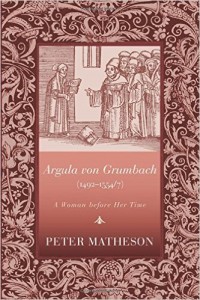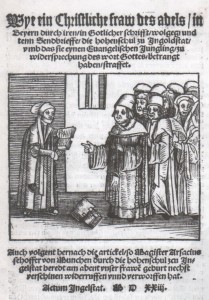"Argula von Grumbach: Courageous Debater, Theologian, Female Voice in the Reformation … A Woman on the Family Tree"
Author: Bobby Valentine | Filed under: 1 Corinthians, 1 Timothy, Apocrypha, Church History, Ministry, Mission, WomenA Forgotten Reformer
A sea of political, social and religious change was flowing through the world in 1492. Christopher Columbus set out on a historic voyage. Not long ago, Guttenberg developed the printing press and books became more available. Spain was united and finally evicted the Muslims from western Europe. Lorenzo Valla demonstrated the power of the new learning of the Renaissance in critiquing the church. It was an era that saw the publication of Copernicus’ heliocentric vision of cosmology in 1543. It was also a time that heard the powerful call for reform of Martin Luther.
In the midst of all this churning, a girl was born in 1492 to a Bavarian family. She would stand like a Judith in front of the harsh and intimidating theologians of the University of Ingolstadt challenging them to a debate. Her name was Argula von Grumbach.
Grumbach’s family was very pious and took their faith seriously. Even though the family’s Franciscan advisors counseled against letting young Argula (a girl!) study scripture because it would “only confuse her,” she was given, at age 10, an expensive and beautifully illuminated Koberger Bible translated into German in the late 15th century (there were vernacular translations before Luther’s. This is a persistent Protestant myth). The stories of Miriam, Deborah, Susannah, Judith, Esther, Mary and a host of others thrilled her soul. Argula, as her later life shows, became a walking German Bible with the vast majority of its contents committed to memory.
At age 17 she lost both her parents to the plague in 1509. A few years later her guardian, Hieronymus, was executed for political intrigue. She would then marry Friederich von Grumbach. She would eventually put her children through college, bury a couple of husbands and carry on extensive correspondence with Luther, Melanchthon, Hubmaier … and she would meet Martin Luther face to face on 2 June 1530. She traveled, wrote and debated all of which was way beyond the comfort zone of most European men of the day.
Standing in the Gap
By 1522 Lutheran ideas were making inroads into southern Germany and the court declared the importation of these ideas to be illegal. A young teacher at the University of Ingolstadt, Arsacius Seehofer, who had been to Wittenberg became a supporter of Luther’s reform. The theologians brought pressure to bear and he was put on trial, forced to recant and exiled to the monastery.
When no one stepped forward to defend Seehofer, Argula stepped into the gap herself. On September 20, 1523 she issued a letter, that was turned into a booklet, the first ever written by a Protestant woman, addressed to the city council and leading theologians of the university. Here is an abbreviated title for her booklet, The Account of Christian Woman of the Bavarian Nobility Whose Open Letter …” Here are some selections of that booklet a selection from the Preface which most scholars have attributed to Andreas Osiander:
“Brothers: it is time to rouse ourselves from sleep. For our salvation is closer than we think. Therefore, my Christian reader, and you, to, you blind, raging, deluded Pharisees – you have always resisted the Holy Spirit … Many are now quite aware of this saying {i.e. Joel 2} and now it is quite evident in the person of the woman mentioned above {Argula}, that she criticises {sic} the biblical scholars at the University of Ingolstadt for their persecution of the holy Gospel (as Judith, chapter eight, the false priests), and exhorts and instructs them, citing a host of ‘insuperable’ divine writings.”
Argula realizes she has “crossed the line” so to speak. The world may have been undergoing radical change as we have seen but it was not prepared for a woman who thought for herself. She explains her actions,
“I suppressed my inclinations, heavy of heart, I did nothing {about the persecution}. Because Paul says in 1 Timothy 2 {v.12f} But now that I cannot see any man who is up to it, who is either willing or able to speak, I am constrained by the saying, ‘Whoever confesses me” …”
Matthew 10 and many female examples in Scripture (listed above), Argula believed, charged her as a disciple to stand up and speak. Jesus not only gave her permission to speak but he in fact commands her to speak, “whoever confesses me.”
Argula demanded that the theologians prove from Scripture what Seehofer affirmed was in fact heresy. She even challenged them to a public debate. Argula had a formidable knowledge of the Bible, so much so that Balthasar Hubmaier declared that she, a woman, “knows more of the divine word than all these red hats {the theologians} ever saw or could conceive of.”
Needless to say the theologians did not accept her challenge.
Wrath of the Theologians
But the theologians were ticked off! In fact, the wrath of the theologians knew no bounds. Rather than debate her, the powers that be fired her husband and ordered him to bring her in line. He was to use violence if necessary. She needed to remember her “place.” She became the target of Professor Hauer’s sermons. In one sermon on December 8, he used the following epitaphs for her. Argula was a
“female devil,”
“female desperado,”
“wretched and pathetic daughter of Eve,”
“arrogant devil,”
a “fool”
and he tops it off by calling her a “heretical bitch” and “shameless whore.” He could not believe that she would make the Virgin Mary equal to all women. Certainly not the most uplifting sermon!
Despite the attack of the theologians, Grumbach’s booklet became a bestseller and went through no less than sixteen editions and she became a household name. She was not done writing for the cause of reform either. She exhorted Frederick the Wise and German nobility in several other essays including a lengthy poem that is sort of her “self-defense” against the slander of her enemies.
Her enemies included her husband who remained a faithful Roman Catholic. In her poem she reveals how she wants to treat her husband correctly but refuses to let him decide her faith. She writes against the charge that she was a poor wife and mother,
“But how can I profit from such as you
Who force the people the truth to eschew?
You even dole out free advice
How we should offer obedient service
And hold our husbands in esteem
Anything else would make me squirm!
My heart and soul are both inclined
To be at his service at all times
Delighted always to obey I’d hate it any other way!
And I trust that to all it’s plain
He has uttered no word of complaint.
May God teach me to understand
How to conduct myself toward my man.
But should he ever wish to force me
From God’s word, compel or coerce me
I should think that counts for nought
(Which seems to be your anxious thought)
As I find in Matthew written
You can read it in Chapter Ten:”
Authorized to Testify
Argula appeals to Matthew 10’s [verse numbers did not exist in the biblical text] “whoever confesses me” and applies that to the “priesthood of all believers.” She insisted the priesthood of all believers” was not not simply the priesthood of all men. She believed the “whoever” applies equally to herself and all who dwell in the kingdom.
Argula stated that her writing was no “woman’s chit-chat, but the word of God.” And it was not. Her writing is serious biblical interpretation … She refused to be put down. Unheard of in that day, she traveled (alone) to Nuremberg to encourage German princes to accept Reformation principles. In 1530 she traveled to meet Martin Luther. She tried to mediate, and even arranged, a meeting between Melanchthon and Bucer to come to a compromise on the Lord’s Supper controversy beginning to divide Protestants.
 Recovering this Female Reformer
Recovering this Female Reformer
It is tragic that Argula’s name has been lost for most Christians, especially Protestants. While she was not Luther in reputation or influence, she was a great witness for Christ. She challenged powerful stereotypes that prevail even today in many places. When others ran, she stood in the gap. The biblical knowledge she pursued as a life long quest paid rich dividends in her writings and teaching. Even today her material is challenging and edifying and conducive to theological reflection.
So was Argula a “she devil” as the theologians called her? Or was she, as Hubmaier said, another Deborah, Huldah, Judith or one of Philip’s daughters. She was a remarkable woman … and I am happy to have this theologian on the Family Tree.
A very good introduction to Argula is the recent collection of her works, Argula von Grumbach: A Woman’s Voice in the Reformation (T & T Clark, 1995) edited by Peter Matheson. All the quotations above come from this book. It is well done and better yet you get to read Argula’s own writings.
Shalom,
Bobby Valentine


September 11th, 2007 at 3:36 pm
Good morning Bobby. I have really enjoyed your blogs on women in the church history.
I am in San Diego this morning and will not ne a your class for next three weeks, but will finish the reading.
Gog Bless.
Wayne B
September 11th, 2007 at 4:58 pm
Bobby – As usuall veryinformative and instructive.
God Bless
Charlie
September 11th, 2007 at 6:38 pm
You make history not only rich and enjoyable to learn but also very intriguing. In school it always seemed so dreary and boring.
Thank you!
September 11th, 2007 at 6:56 pm
It seems dreary and boring because no one teaches the good stories; they’ve all been edited down to parlor-safe homilies.
Nick
September 12th, 2007 at 3:03 pm
Bobby, I too have been reading your posts on the women in church history and have remained slient as long as I can, I feel I must speak out. “out of this world posts brother keep up the great work”
September 14th, 2007 at 2:25 am
Bobby,
Why has the church been so silent in teaching and making these women known? What a difference they have made and played in Church history and it seems as if they have been erased from history. It is sad. It saddens me that we are so ignorant and have maybe even in allowing this history to be done away with to play a role in the way women serve and function our Churches today. Thanks for informing us on these women and the differnce that have made on the church as well as its history. God bless you brother for bringing this to light.